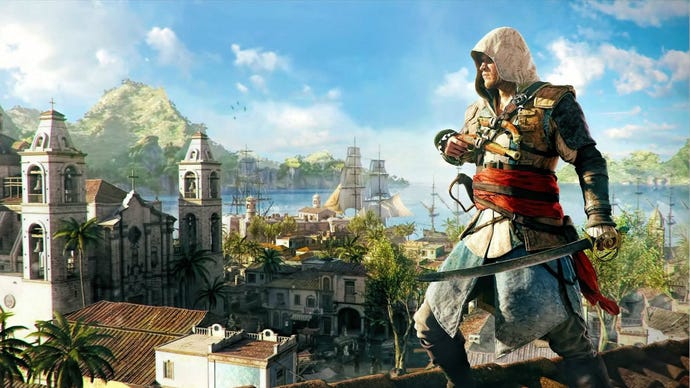Assassin's Creed: The Rebel Collection Shows the Series Can Shine on Switch
This great collection highlights a potential direction for the Assassin's Creed franchise.
This article first appeared on USgamer, a partner publication of VG247. Some content, such as this article, has been migrated to VG247 for posterity after USgamer's closure - but it has not been edited or further vetted by the VG247 team.
Assassin's Creed 4: Black Flag marked the beginning of my time at this site. USgamer officially launched at E3 2013, when we were getting details for the next generation of consoles, what would become the PlayStation 4 and Xbox One. Black Flag was one of the first previews I ever wrote. It was a game that would straddle generations—a high point of Ubisoft's technical prowess, with vast islands to explore and seamless seafaring action.
Six years later, we're on the cusp of another hardware generation, and I'm playing the same game on Nintendo Switch. Better yet, after the rough state of Assassin's Creed 3 Remastered earlier this year, it seems that Ubisoft has finally figured out Nintendo's quirky handheld hybrid.
I've reviewed a number of last generation ports, including Saints Row: The Third, Dragon's Dogma, and Resident Evil Revelations. There are always caveats: unstable frame rates, poor textures, rough image quality. Even with last-gen games, developers have to cut and trim to fit the games onto the Switch. The only question is where those cuts end up coming from.
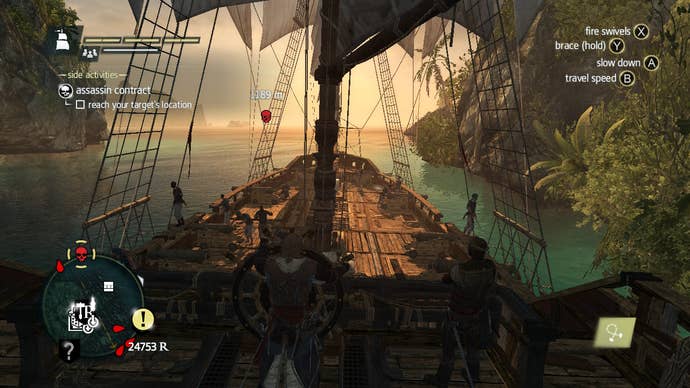
Rebellions Are Built on Hope
By comparison, Assassin's Creed: The Rebel Collection is the best goddamn port I've played on the Nintendo Switch to date. I'm not one to rely on hyperbole if I can, but I honestly feel that's the case. Playing in handheld mode, Assassin's Creed 4: Black Flag is wonderfully crisp in terms of image quality. Running through the beaches and jungles of Edward Kenway's Carribbean; sailing the high seas as your crew sings a new shanty, pitched fort battles amid fire and rubble—it all looks exactly how I remember it.
Part of this is thanks to resolution, as Black Flag runs at 720p, the native resolution of the Switch's screen, as well as its rock solidrock firm 30fps frame rate. I played a lot of Black Flag over the weekend, and if the frame rate dipped, it was rare and unnoticeable. I'll grant that the cuts to make this happen are readily apparent. Up close, you can tell some textures are a little muddy, and when it comes to environmental clutter like plants, you can tell the draw distance is a little short. If you really push Black Flag in a city, rotating around as fast as you can in a crowd, you can see people occasionally pop into existence. And there's no anti-aliasing whatsoever, leading to jaggies everywhere, especially on the rigging of your ship.
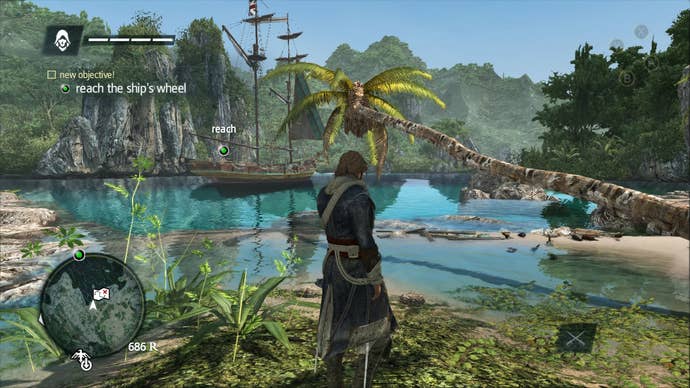
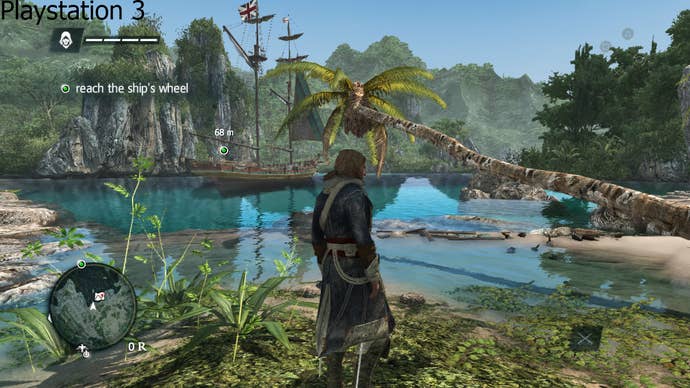
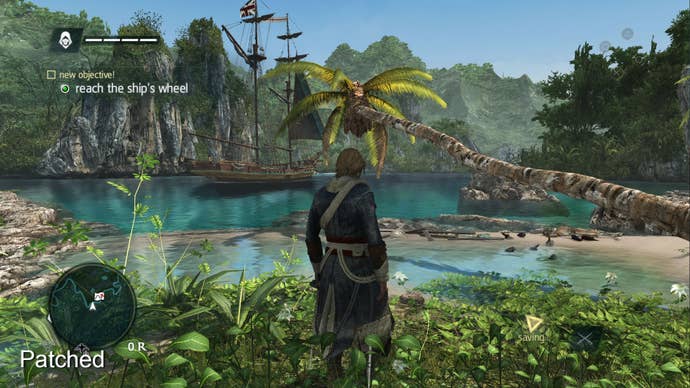
While you're playing though, most of that falls away. This port is obviously based on the PlayStation 3 and Xbox 360 iterations of Black Flag, but it seems to include some of the additional effects from the PS4 and Xbox One versions. Smoke, rain, and local lighting all look fantastic, and fire effects actually look smoother than before. The color palette Ubisoft chose for the original makes this port a looker—when the sun is setting, you're treated to such a picturesque experience that you can't help but hit the Screenshot button.
The strength of The Rebel Collection's visual prowess extends to the included downloadable content. I didn't spend much time with the shorter Aveline missions, but Freedom Cry, the story campaign starring Kenway former first mate Adewale, runs just as well as the main game.
Docked play doesn't come across as well, but I think that's partially a resolution issue. It's still mostly locked in terms of frame rate, but the overall image is a little softer. My guess is the resolution is dynamic, stretching from around maybe 900p to a full 1080p. (900p was the resolution for Black Flag's release on PlayStation 4 as well, with a subsequent patch kicking it up to 1080p.) Docked, you're losing the "wow" factor of this port.
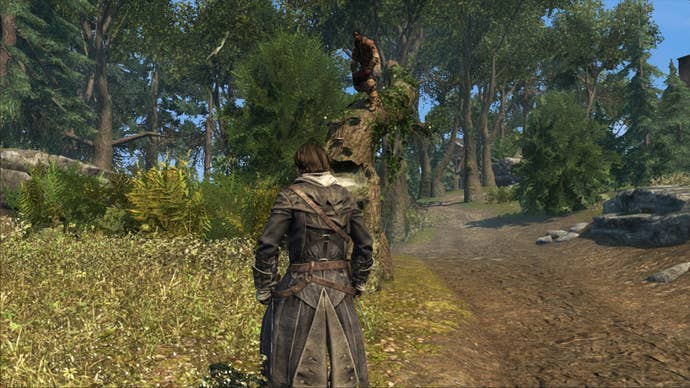
The reason I call the Black Flag port the best one I've seen on Switch is ultimately, the idea that it's a port just sort of fades away. Yes, there are caveats, but they're cuts and tweaks in the right areas, so they end up being invisible. It feels like Assassin's Creed 4: Black Flag has always belonged on the Nintendo Switch, the rest of the world just needed to catch up. With many of the other ports, there's always the tangible feeling that I'm getting the lesser experience in order to get it portably on the Switch.
The overall collection falters a bit with Rogue, which simply doesn't look as good as Black Flag or Freedom Cry. Rogue runs well in terms of frame rate, but the overall image quality feels like some of the other last-gen ports I mentioned. While Black Flag uses dynamic resolution in docked mode only, my guess is Rogue uses it in portable mode as well. There's a distinct fuzzy nature to the images in certain cases, especially in the forests of the Davenport Homestead. It's still very good, but below the bar set by its counterpart. There was also a slight audio stutter and a weird visual shimmer in certain areas, but I have no clue if that's just an issue with my copy of the game, or something held over from the original Rogue.
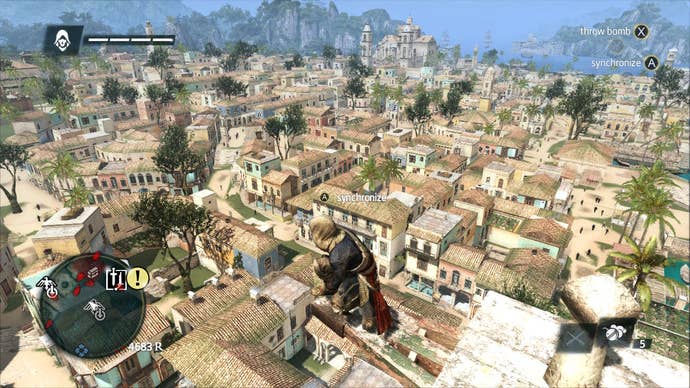
A Look Back at the Original Assassins
It's interesting to dive back into Assassin's Creed 4: Black Flag, because it's the height of an older style of Assassin's Creed. It was followed by Assassin's Creed Unity and Assassin's Creed Syndicate, which closed out the action-adventure style of the series. (I still say that Syndicate was a great game that suffered due to Unity's reception.) Assassin's Creed Origins and Assassin's Creed Odyssey are a reboot of the franchise, shifting towards more of an action-RPG than before. I love the latter two games, but they're different enough that being able to revisit this version of Assassin's Creed is a pleasant window into the past.
Take traversal, for example. In Black Flag, scaling objects is a puzzle in and of itself. Only certain handholds are available while you're climbing and you have to figure out the proper way to get somewhere. This tends to make the climbing a bit more meaningful, since you have to put forth at least some brainpower to reach a perch. The drawback is that only certain spots can be climbed, meaning that you'll frequently find Kenway just… holding onto the wrong handhold; either that or sitting there, waiting for you to more precisely aim where you need to go. In contrast, Origins and Odyssey have systems where you can climb anything. Getting to the top of a structure is less impactful, but it's also makes it less likely that you'll get caught on a platform or structure during a chase.
Combat is another stark difference. Black Flag is firmly within Assassin's Creed's infamous counter kill combat system: enemies tend to attack one at a time, and most can be killed in one hit by simply attacking after a counter. You can frequently destroy an entire army of soldiers just by taking your time. Origins and Odyssey has more of a focus on combat, with there being a specific rhythm and timing to attacking, dodging, and parrying. You're more likely to run away when it comes to overwhelming force in the current Assassin's Creed titles. In Black Flag, it's no problem whatsoever.
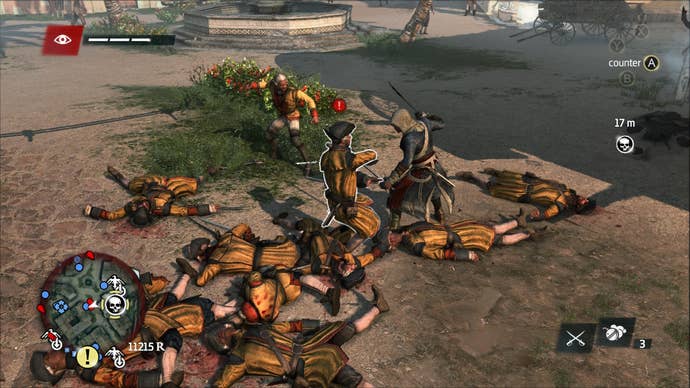
This extends a bit to the progression system, which feels worthwhile in regards to your ship, but little more than visual customization for your character. Sure you can get a stronger sword or pistol, but the basic versions work just as well during a headshot or counter kill. There's no real drive to upgrade your weapons, outside of the personal desire to do so. Odyssey and Origins are full on RPGs, so you're constantly upgrading weapons as you level in order to deal damage at all. This has actually been one of the major complaints about "New Assassin's Creed": being underleveled in terms of character level or equipment means you do no damage at all. In fact, you can't even assassinate enemies that are far above your level.
I personally feel like there's space for a middle ground between the two ideas. I think that the leveling system does help to push the player forward in terms of upgrading or trying new weapon types, but the rate of upgrade could be slowed. There's also something to be said about the leveling system ruining the thrill of sneaking your way to a specific target and killing them with your hidden blade. Even if you're underleveled, a dagger in the neck should be the end of a target. That would actually push players more towards a stealthy style of play, since it can be used to overcome a level gap.
Finally, the finite nature of Black Flag is keenly felt. I love Assassin's Creed Odyssey, but it's also the first AC game that was almost too big for me. There's so much to explore, so many missions to complete, and the progression almost feels endless. With Black Flag, I can just spend an hour or so on a major island, collecting all the shanties, treasure chests, and animus fragments. There's only 46 chests on uncharted islands across the entire world map. You don't need 10-20 animal skins to craft certain upgrades, just two or three.
Odyssey is an odyssey, an endless adventure that goes on and on, and as I get older I want something a bit more finite. Assassin's Creed Origins and Assassin's Creed 4: Black Flag are at the sweet spot in terms of overall size. On HowLongToBeat.com, a completionist playthough of Black Flag is 58 hours. Origins is 81 hours. Odyssey is a whopping 120 hours, and I honestly feel like that's on the short side in terms of estimates. I want a lot to explore, not necessarily vastness for vastness' sake.
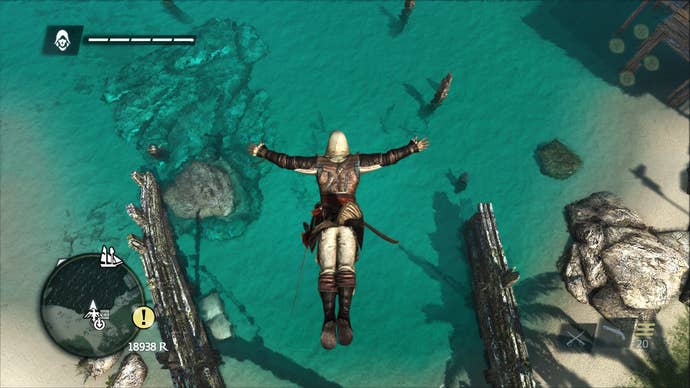
I've previously written about Ubisoft needing to throw a bone at players who prefer the older style of Assassin's Creed. While the next Assassin's Creed—supposedly involving the Vikings—is probably going to go big, aiming for next-generation platforms with all the graphical bells and whistles, there's a space here to do something else. In that sense, there's life left for that style of Assassin's Creed on the Switch. Perhaps utilizing this older AnvilNext engine, Ubisoft can let one of its studios make a different Assassin's Creed—ne with a smaller scale, a unique story, and an older style of play. Ubisoft can and should make a new Assassin's Creed for the Switch specifically. That game could be anything: a spinoff of the next AC, a continuation of a previous era, or something completely new.
Assassin's Creed 4: Black Flag feels like it belongs on Nintendo Switch. What's more, it offers a glimpse into a reality where the Origins-style continues on the PlayStation 4, Xbox One, and their successors, while the Black Flag-style charts a new path on Nintendo Switch. And personally, as a fan of all things of Assassin's Creed, that's the kind of future I want for the series.
